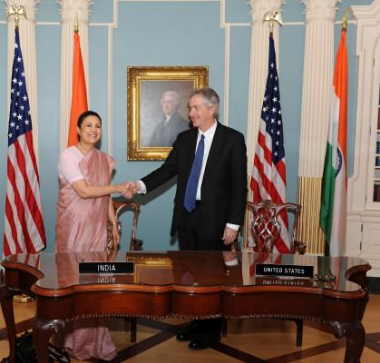India-US reprocessing agreement signed
02 August 2010
Nuclear energy cooperation between the USA and India has taken another step forward with the signature of an agreement that will enable India to reprocess US-obligated nuclear material.
The agreement on arrangements and procedures for reprocessing signed in Washington by US under secretary of state for political affairs Bill Burns and Indian ambassador to the USA Meera Shankar is the culmination of over a year of negotiations. Once it enters into force, it will mean that India will be able to reprocess US-obligated nuclear materials at a new national facility dedicated to the reprocessing of material under International Atomic Energy Agency (IAEA) safeguards.
 |
Ambassador Shankar and Under Secretary Burns seal the deal (Image: Embassy of India)
|
The US State Department is keen to point out that the reprocessing agreement was negotiated and concluded under the administration of President Obama, although in fact it follows on from the US-India nuclear cooperation agreement finalised during the previous US administration. Nonetheless, it is a prerequisite for US nuclear fuel suppliers to carry out trade with India, which has a flourishing nuclear power program but only modest domestic uranium resources. The US, which currently does not carry out reprocessing of spent nuclear fuel, has previously only extended similar consent to European Union countries and to Japan.
Speaking at the signing ceremony, Ambassador Shankar talked of India's ambitious nuclear development program – the country plans to have 35,000 MWe of nuclear capacity installed by 2022 and 60,000 MWe by 2032. "International cooperation, including cooperation with US firms, is an important component of this plan," she said, going on to mention that the Indian government has already designated two sites for nuclear power plants to be established in cooperation with the USA. "The companies of the two countries are now engaged in discussions," she said.
Although not a signatory to the international Nuclear Non-Proliferation Treaty (NPT), India has a comprehensive safeguards agreement in place with the IAEA, plus an Additional Protocol agreed by the IAEA in March 2009 but not yet ratified by the Indian government. Another important milestone for overseas cooperation in India's nuclear program will be the country's proposed law on nuclear civil liability, which is currently before the Indian government but has been the subject of much contention between Indian politicians.
Researched and written
by World Nuclear News